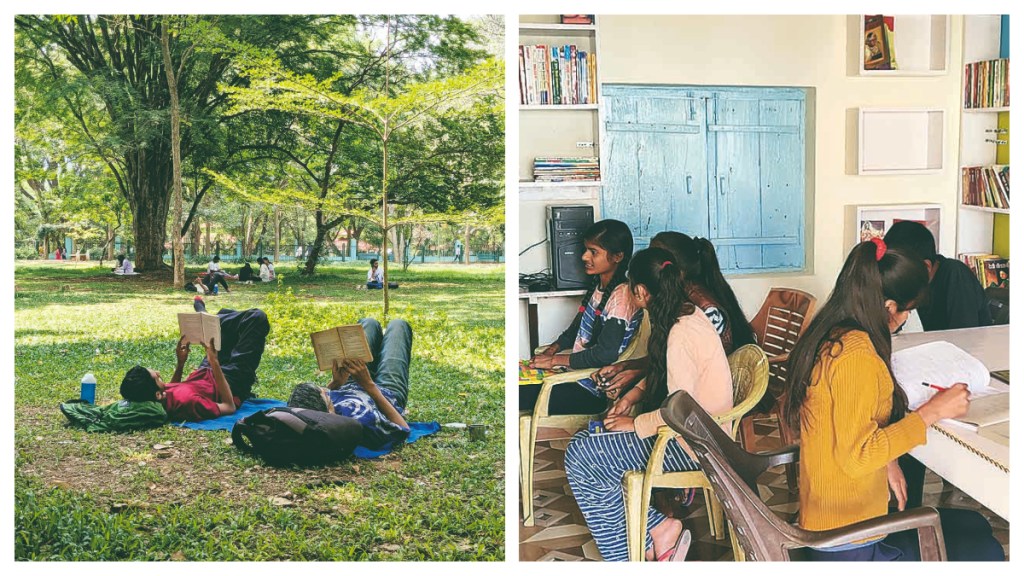After almost 40 years in business, Srinagar’s iconic bookstore Bestseller shut shop in April this year. The bookstore’s closure had been in the making for quite some time now. “Over the past few years, our sales have been down by nearly 80%. We just couldn’t compete. We can’t offer the discounts that Flipkart or Amazon does,” Mohammad Saniyasnain, 32, who inherited the store from his father, Sonaullah Chiloo, was quoted as saying in a media report on the store’s last functioning day.
Unfortunately, the Lal Chowk bookstore isn’t the only one to have met this fate. Delhi’s iconic Jor Bagh haunt, The Book Shop, shut its doors in October 2023, as did Lucknow’s famous British Book Depot the same year.
While online competition has been a major pain for bookstores, Saniyasnain told the media that he felt “the new generation is not inclined towards book reading”.
However, that seems to be changing now. A National Institutes of Health study from 2023 suggested that the pandemic altered the reading habits of at least 33% of the survey participants in a positive manner—with them picking up books more often after Covid-19. Leading this change are a host of book reading communities that have sprouted across the country, mainly after the pandemic.
On the same page
Bengaluru residents Shruti Sah and Harsh Snehanshu used to cycle to Cubbon Park and read for a few hours. “The experience of lounging on the grass under the canopy of trees was immensely comfortable and we felt nostalgic about our childhood homes in smaller towns. We shared this Saturday ritual on our personal Instagram profiles and it caught the interest of reader friends who wanted to join in,” the founders of Cubbon Reads say.
That was in January 2023 when the community of book lovers started with just the two of them, and now anywhere between 200 and 500 people show up every Saturday morning. “The initial thought behind Cubbon Reads was quite simple. It was to build a community of readers who read their books together, not discuss or dissect them. It brought the focus back on the most basic thing—the act of reading—and removed the needless intellectualisation,” they add.
Amie Fazulbhoy, co-curator of Bandra Reads, brought the community to Mumbai (she actually nurtured it from scratch) in 2023 as well—inspired by Cubbon Reads. “A couple of years ago, there was a trend of silent reading communities throughout the country and I thought why not have one in my neighbourhood too,” she says. Two years later, 20-50 people meet every Sunday morning at the Jogger’s Park on Carter Road as part of the group.
Delhi soon followed suit, as Lodhi Reads grew on a similar foot in May 2023. Anushree Malik, curator of Lodhi Reads, feels that when the community first started meeting regularly, what helped it pick up was the pandemic’s hangover. “I think, after the pandemic, people were done feeling isolated and wanted a community, which played a huge factor in the success of the early days,” she says.
But, it wasn’t just the pandemic alone. The gap for a commune of readers had been felt and recognised for long. In 2019, Rachna Kalra, an NCR-based book publicist, founded the Silent Book Club (with editions in Delhi and Gurugram)— inspired by the global silent reading community of the same name started by two women in 2012 in the United States.
Kalra resonates with the Cubbon Reads founders’ sentiment. “I love reading, but I’m not someone who enjoys dissecting every detail of a book in a formal discussion. And I know a lot of people feel the same way,” she says. “I also thought about people who struggle to find uninterrupted reading time at home—between chores, doorbells, and everyday distractions, reading takes a backseat. So I decided to give it a shot and see if enough people would come together just to lounge, read, and, if they felt like it, chat about books,” she adds.
These communities also insist that they are not ‘book clubs’—they don’t have a book of the month, or discuss and debate one particular author that everybody is reading. All of them simply offer a commune for readers to come together, read, interact if they want to, and that’s it.
The third space
What these communities also want to do is not just make reading accessible, but encourage it in a wide range of people. Cubbon Reads, for instance, shares that they have seen kids as young as two years old accompany their parents and grandparents, aged over 80, to their editions.
Similarly, Fazulbhoy shares that curating Bandra Reads sessions has been a wholesome experience because of the many kind people she’s been able to meet through the community.
Members of Lodhi Reads, too, meet every weekend, and depending on Delhi’s weather, 25-40 people show up. “On good days, the number even goes up to 60,” says Malik. “Our main demographic is 20-30 year olds, even though sometimes families, kids, and older folks join us,” she adds.
Kalra’s community, on the other hand, has over 2,500 members and 700 people on their WhatApp group. She’s collaborated with the Goethe-Institut in Delhi and the Museo Camera in Gurugram where the community can host their sessions.
Malik of Lodhi Reads encapsulates what keeps people coming, “It’s a weekly space where readers can just exist in public spaces without spending a lot of money, surrounded by beautiful gardens.” Fazulbhoy nods in agreement. “It’s literally touching grass while hearing the sea waves and catching up on your reading,” she adds.
Turning over a new leaf
The possibilities are endless for what can come out of these communities—friendships, relationships, even an idea for an app, perhaps? Last year, Sah and Snehanshu started Bookmark—a dating app for readers, inspired by their community Cubbon Reads. “We have over 15,000 app installs and are bootstrapped at the moment. We have hosted many editions of reading circles and meet-ups for readers with Bookmark called ‘Sip & Read’, ‘The Marginalised Club’, and more,” they add.
At Bandra Reads too, interesting things keep happening—from activities like book swaps, book donation drives, volunteers helping other members learn different art forms like sketching, watercolour painting, etc, to a month-long celebration for their second anniversary.
Lodhi Reads, similar to its counterparts, likes celebrating milestones. They host book sales in collaboration with community libraries, Christmas potluck lunches, and on their 100th edition, they even did an interactive reading session.
What’s interesting to note is that social media has played a big role in making these communities visible to people, and in turn, promoting reading for leisure.
Shreya Punj, a publisher who runs the handle ‘The Editor Recommends’ on Instagram, believes there’s a lot of nuance hidden behind the popularity of Bookstagram, BookTube, and Indian reading communities on Reddit. “Essentially what online platforms help readers do is weed out trash books. The common reader can’t always identify with what the critics are saying. They need their likes and dislikes to be reflected in pop culture to feel validated about what they’re reading,” she says.
“Humans have a tendency to peacock and they need community. If you’ve read a book and are not able to discuss it with people or add a layer of your perspective, have you even read it?” she asks.
These online platforms aren’t novel in their approach though. This heavy lifting was earlier done by libraries, salons, and literary communities which have simply moved to the internet now—and interestingly, have also made a comeback to the physical spaces.
“Why these communities are important is because reading in India is still largely associated with education. When we see it as a chore, we don’t inherently derive pleasure from the act of reading. But when people see others talk animatedly and passionately about books online, something in the viewer’s mind clicks and makes them question—Can I enjoy reading books? Are they not just for marks? Can I, with my adult money, buy a book and read it just to feel something? The inspiration and desire to read can come from anywhere, online platforms are just making it accessible,” adds Punj.
Special editions
Curiously though, it’s not just these communities that are helping encourage more and more people to read. A lot of community libraries have also sprouted up in different parts of the country.
Take, for instance, the Bansa Community Library started by advocate Jatin Lalit in his Uttar Pradesh hometown in 2020. As a law student, Lalit had volunteered with The Community Library Project in Delhi and Gurugram which had opened up an entirely new world for him. What Lalit aimed to do was “encourage a reading culture, and make books accessible for the villagers”.
“We don’t want this to be a mini-school or tuition. We want to inculcate the habit of reading for pleasure in the people of Bansa. But for that, they need to know how to read, have the time, and feel that it is a fruitful use of their time,” adds Lalit.
In another Uttar Pradesh district, the Mirzapur Community Library has been thriving. It was actually because of a government services aspirant, who struggled balancing work at his family’s vegetable shop with his studies, that the Mirzapur library took shape.
Its founder Rahul Mishra tells FE, “Situated in Mukeri Bazar, surrounded by bustling vegetable vendors, the library serves as a peaceful retreat where people can read for pleasure or study for various competitive exams. Many members, including students preparing for UPSI, Railway, UPPSC, UPSC, UGC NET, and board exams, benefit from the resources available. It welcomes everyone, regardless of caste, gender, or disability, and is dedicated to fostering a love for reading.”
The results of the libraries’ efforts have been glorious too. In Bansa, the community library functions on the village temple land, is equipped with books on different subjects and computer systems, is open 24×7, and has about 2,300 registered members. About 100-120 people come to the library on a daily basis. “A majority of our members are school children and those preparing for competitive exams,” shares Lalit.
On the other hand, the Mirzapur library has 700-800 active members. “Managed entirely by the community, it operates on a rotation system where local vendors open the library with their shop, arrange books, and maintain cleanliness, ensuring a collaborative effort,” says Mishra. The Mirzapur library hosts sessions like learning competitions, painting events, and encourages women to join and pick up books.
“Kids from Bansa are now participating in reading marathons, which was unheard of just a few years ago. Kids from my village are becoming interested in and confident of telling their own stories. People like stories, you just need to create a culture where reading is encouraged,” adds Lalit.
Business of reading
A major takeaway shared by these communities is that more and more people are now reading, and interestingly, this is being reflected in the business of publishing and books as well.
In the beginning of May, publishing house Simon & Schuster collaborated with Radisson Hotels in India, for an initiative called A Literary Escape. Abhay Singh, senior manager for marketing and publicity at the company, tells FE, “There are so many people who love to read when they travel, and it’s almost like an escape for them. So we’ve launched this initiative to organise special types of events like book launches, book-related retreats at their properties across the country. People can just sign up through our posts on social media, it’s not chargeable, and is meant to be accessed by all.”
Ajay Jain, founder of Kunzum Books, an iconic book haunt in Delhi, too, feels that readers want both interactive activities and crave community—a gap bookstores like his are actively working to fill. “There are two kinds of customers. One prefers to be left to themselves. The other customer decides ‘socially’—they check what’s trending in communities, book clubs, or even what they see others posting online. And then they themselves are likely to make a public show of what they are reading by posting online, for others to take a cue from them,” he says.
“Bookstores like ours play a big role in this shift because we have been designed for the ‘discovery’ of titles one is not necessarily looking for. We also have a strong emphasis on events, displays, recommendations, and conversations,” adds Jain.
Books and reading have evolved from an individual hobby to a community-driven and community-driving activity, relished by people together, across cities and regions. This is something noted by e-commerce giant Amazon too. Rajarshi Guin, director of books and toys at Amazon India, says, “Our books category has seen double-digit growth across all segments. While metros remain our largest market, tier 2 and 3 cities are outpacing them by 2x in new customer acquisition.”
BOX – THE FINE PRINT
15% Y-o-y growth in fiction, self-help, business books
30 Academic books delivered every minute nationwide
2x Spike in Malayalam and Tamil reading15-20%
Spike in Hindi, Bengali, and Kannada reading
Source: Amazon India









